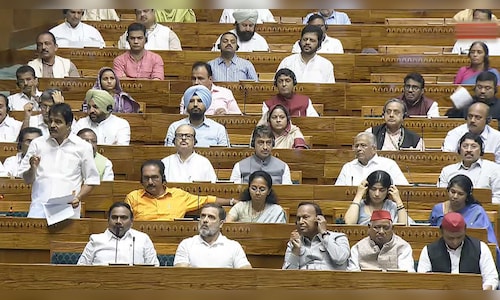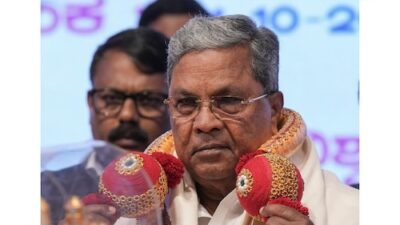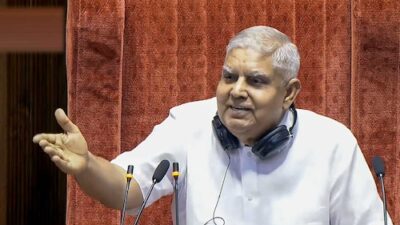The Bill passed after all opposition amendments were dismissed through voice votes, culminating in a division of votes—288 in favor and 232 against.
During his response to the debate, Union Minorities Affairs Minister Kiren Rijiju stated that no place in the world is safer for minorities than India, emphasizing that their safety stems from a predominantly secular majority.
He noted that even small minority groups such as the Parsis feel secure in India, and all minorities take pride in their existence here.
“Some members have claimed that minorities are not safe in India. This assertion is entirely false. There is no place safer than India for minorities. I, too, am a minority, and we all live here without fear and with pride,” he remarked following the debate on the Bill.
The minister mentioned that whenever a minority community faces persecution, they seek refuge in India, citing examples such as the Dalai Lama and the Tibetan community, along with minorities from Pakistan, Bangladesh, Afghanistan, Myanmar, and Sri Lanka.
“Minorities from Bangladesh, Pakistan, and Afghanistan have turned to India after enduring religious persecution in their homelands. How can one claim that minorities are not safe in India? It is extremely incorrect to say this.
“The next generation will not forgive you for this. Minorities in India are protected because the country’s majority is entirely secular. This is not the situation in Pakistan, Bangladesh, or Afghanistan. Yet, you still choose to criticize us,” he asserted.
Rijiju explained that through this Bill, the NDA government intends to unify all minorities within the nation. He also underscored the “wholehearted” support from the Christian community for the Bill.
He pointed out that numerous disputes remain pending with Waqf tribunals, and the legislation aims to expedite these cases.
“Our goal is to hasten the resolution of disputes in the tribunals. Delayed justice is denied justice. This Bill will provide justice to widows, divorcees, and orphans,” he stated.
Earlier, during the debate, Union Home Minister Amit Shah emphasized that a vote bank is being established through the intimidation of minorities and the confusion being disseminated in the name of the Waqf Bill.
“The Narendra Modi government is grounded in a clear principle: we will not enact any law for a vote bank, as legislation should serve justice and the welfare of the people,” he affirmed, adding, “Everyone has the right to practice their religion, but conversion cannot stem from greed, temptation, or fear.” He highlighted that fostering fear among minority communities has become a troubling trend.
“The Modi government is committed to ensuring that no citizen, regardless of their religion, will be harmed,” Shah declared.
He explained that non-Muslim representatives in Waqf councils and boards are solely intended to oversee the administration of properties according to their stated objectives.
Shah remarked that had there been no amendment to the Waqf Act in 2013, there would have been no need for this new legislation.
“Elections were imminent in 2014, and in 2013, the extreme Waqf law was hastily enacted for the sake of appeasement. Consequently, 123 properties in Delhi’s Lutyen’s Zone were transferred to the Waqf just 25 days before the elections,” he recounted.
He reiterated that a vote bank is being fostered through the intimidation of minorities and the creation of confusion designed to induce fear within them.
Previously, there had been no provision to include any non-Muslim individuals among those managing religious institutions, and the NDA government will not make such changes either, he clarified.
Congress MP Gaurav Gogoi expressed that the INDIA bloc will challenge the proposed modifications to the Waqf law, calling the Bill an assault on the fundamental framework of the Constitution.
He accused the government of misleading Parliament, referring to prior discussions on the issue.
“This Bill is an attack on the fundamental structure of our Constitution, an assault on our federal structure, with four main objectives: to dilute the Constitution, to defame minority communities, to divide Indian society, and to disenfranchise minorities,” he asserted.
Samajwadi Party leader Akhilesh Yadav claimed the Bill is a BJP tactic aimed at polarization in light of its setbacks in the 2024 Lok Sabha elections. He suggested the Bill would send a negative message to the world and undermine the country’s secular reputation.
He stated that the Bill would become a “Waterloo” for the BJP, hinting that although some of its allies may publicly support the legislation, they are privately discontented.
In his participation, AIMIM chief Asaduddin Owaisi conducted a symbolic protest by tearing up a copy of the Bill.
Leader of the Opposition in Lok Sabha Rahul Gandhi characterized the Waqf Bill as a tool aimed at marginalizing Muslims and appropriating their personal laws and property rights in a post on X.
“This assault on the Constitution by the RSS, BJP, and their allies targets Muslims today but sets a precedent for future attacks on other communities,” he stated.
The Waqf (Amendment) Bill aims to reinforce Waqf tribunals, maintain a structured selection process, and fix tenures to ensure effective resolution of disputes.
According to the Bill, while Waqf institutions’ obligatory contributions to Waqf boards will decrease from 7% to 5%, those earning over ₹1 lakh will undergo audits by state-appointed auditors.
A centralized portal will automate the management of Waqf properties, enhancing efficiency and transparency.
The Bill proposes that practicing Muslims (for a minimum of five years) can dedicate their properties to the Waqf, reinstating rules prior to 2013.
It also requires that women receive their inheritance before the declaration of the Waqf, with specific provisions for widows, divorced women, and orphans.
Furthermore, the Bill proposes that an officer above the rank of collector investigate government properties claimed as Waqf.
It suggests that non-Muslim representatives be included in the central and state Waqf boards to promote inclusivity.



